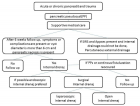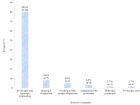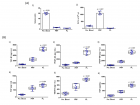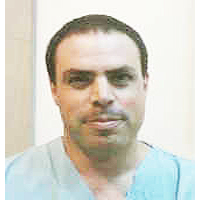Table of Contents
Case Report: Intussusception in an Infant with Respiratory Syncytial Virus (RSV) Infection and Post-Operative Wound Dehiscence
Published on: 7th January, 2025
Intussusception is a leading cause of intestinal obstruction in young children, typically presenting with colicky abdominal pain and altered stool characteristics, before progressing to abdominal distension and bilious vomiting. This case report describes an 8-month-old male who presented with gastrointestinal symptoms, respiratory distress, and signs of intestinal obstruction. The patient was diagnosed with intussusception and found to be positive for Respiratory Syncytial Virus (RSV). After an attempted ultrasound-guided hydrostatic fluid enema, he underwent laparotomy to resolve the intussusception but developed post-operative complications, including delayed wound healing and wound dehiscence. The interplay of viral infections like RSV, and treatments such as steroids in pediatric surgical cases warrants further attention, especially concerning postoperative outcomes.
Fostering Pathways and Creativity Responsible for Advancing Health Research Skills and Knowledge for Healthcare Professionals to Heighten Evidence-Based Healthcare Practices in Resource-Constrained Healthcare Settings
Published on: 5th February, 2025
Globally, evidence-based healthcare practices are the most dependable framework for effective healthcare decisions and practices. In all nations, financial resources, people, and time are always insufficient. Healthcare professionals should recommend healthcare interventions that have been proven to be safe, effective, and affordable. All healthcare professionals must be creative to be involved in the creation and compilation of trustworthy evidence to support the decrease in morbidity and mortality of communicable and non-communicable diseases, particularly in developing nations. Regretfully, most developing nations still exhibit weaknesses and barriers to promoting health research and evidence-based healthcare. Evidence indicates that developing countries contribute 1% - 2% of health research activities to address global health problems and challenges. As a result, many individuals in these nations continue to have below-average health conditions. The lack of creativity, innovation, and motivation to gain health research competencies for healthcare professionals causes all these issues. Creativity and innovation are the foundations for the effective implementation of evidence-based healthcare. Surprisingly, no researchers have explored how creativity and innovation heighten evidence-based healthcare practices. The primary objective of this project will be to foster pathways and explore the creativity that advances health research abilities among healthcare professionals to improve evidence-based healthcare practices in resource-limited healthcare settings.
Prevalence and Risk Factors to Preterm Labor through a Study in Jiblah University Hospital, Ibb, Governorate, Yemen
Published on: 18th February, 2025
Background: Preterm Birth (PTB) is the largest direct cause of neonatal mortality and the second leading cause of under-five mortality following pneumonia. Although there are studies conducted before, the magnitude of PTB remains a major issue in most developing countries including Yemen. Therefore, this study aims to assess the prevalence and associated factors of premature birth among newborns delivered in Jiblah University Hospital in Ibb governorate, Yemen.Objectives: No studies have previously been conducted about preterm labour in Jiblah University Hospital in Ibb governorate, Yemen.Methods: This retrospective observational study was conducted in the Department of Obstetrics & Gynecology, Jiblah University Hospital in Ibb Governorate, from 1 December 2023 to 29 February 2024.Results: A total of 1350 pregnancies, 252 (18.67%) were preterm deliveries and 1089 (80.66%) were full-term deliveries at Jiblah University Hospital, Ibb. Our study shows the distribution of participants based on socio-demographic factors. The data that out of the total 252 female participants, with ages mean ± std = 27.43 ± 6.34 roughly 18.67% experienced preterm deliveries. Our study demonstrates that several factors are significantly linked to preterm birth, including the number of siblings, blood pressure, gravida, and abortion number, where the Chi-square p - value was < 0.05. On the other hand, the results from the logistic regression analysis indicated the predictive potential of certain socio-demographic factors in relation to preterm birth. Conclusion: In this study, the number of siblings, blood pressure, gravida, and abortion number are the risk factors for premature delivery. Recognizing the most common risk factors for PTB will help to increase awareness about high-risk pregnancy, improve the preventive measures of preterm risk factors, and modify preterm care protocol in nurseries.
Impact of the MELD Scale on Hospital Admissions for Hepatocarcinoma (2000 to 2018), Brazil
Published on: 14th March, 2025
Background: The health professional appears to be concerned given the number of questions surrounding the patient’s post-transplant survival, patient selection method, and the continuous search for scores that reflect their reality and reconcile the results they desire with the patient’s expectations. It is from these considerations that the present work was born with the purpose of understanding the reality of patients hospitalized for hepatocellular carcinoma and what adherence to the Model For End-Stage Liver Disease (MELD) criteria meant in Brazil. Methods: This study is a discrete, univariate time series on emergency hospitalizations that occurred between 2000 and 2018, in the city of São Paulo, Brazil. Python version 3.11 was the software used for statistical treatment and analysis of the time series. Results: There were 6887 hospitalizations for malignant neoplasm of liver and intrahepatic bile ducts, in the period 2000-2006, of which 2898 were elective and 3915 (56.85%) were urgent in the period. There was an increase of 63.97% in the number of emergency hospitalizations in relation to the period 2000-2006 and 2007-2013. To highlight, in 2013 there were 1270 emergency admissions, which represented an increase of 109.22% in relation to the number of emergency admissions in 2006. The contingency correlation analysis demonstrated a significant association between the variables in which the chi-square value was 82.18, the p-value was 1.24 x 10-19, and the critical value was 3.84 with one degree of freedom. There was a 123.65% increase in the number of hospitalizations for chronic hepatitis, not elsewhere classified, between the periods 2000-2006 and 2007-2013. The chi-square value of the contingency association was 221.22, with a p-value of 4.90 x 10-50, a critical value of 9.488, with a significance level of 5% and one degree of freedom. The study showed an increase in hospitalizations of 21.88% for alcoholic liver disease between the periods 2000-2006 and 2007-2013. In the period 2000-2006, there were 21330 hospitalizations, 19224 of which were urgent (90.13%). In the period 2007-2013, there were 25997 hospitalizations, of which 22,802 (87.71%) occurred urgently. The chi-square value was 68.95, the p-value was 1 x 10-16, and the critical value was 3.84, with one degree of freedom. Conclusion: The MELD score, as it is sensitive to the patient’s severity, selects those who are at an advanced stage of the disease for liver transplantation. In this scenario, patients do not necessarily have access to outpatient services and begin to attend them regularly when MELD identifies the advanced stage of the disease, opening a gap between prevention, treatment, and rehabilitation.

HSPI: We're glad you're here. Please click "create a new Query" if you are a new visitor to our website and need further information from us.
If you are already a member of our network and need to keep track of any developments regarding a question you have already submitted, click "take me to my Query."


















































































































































